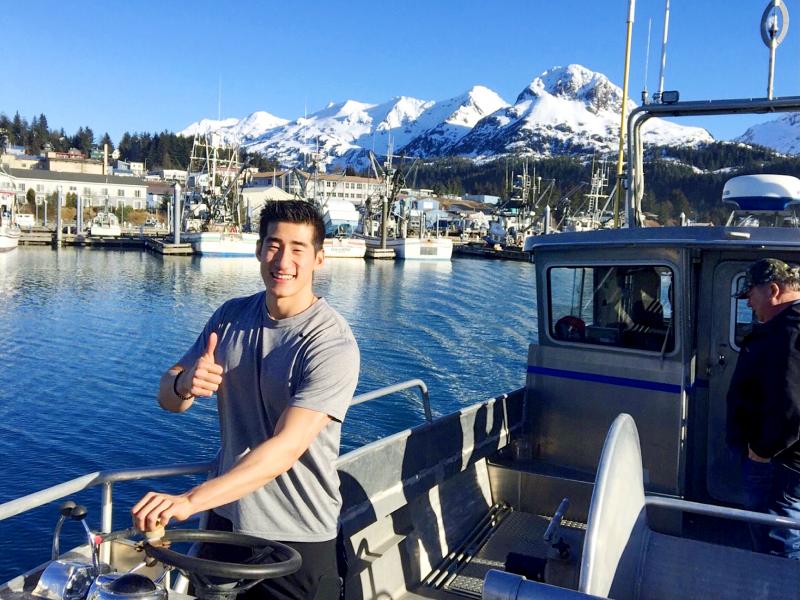Commercial fishing might not have been the career his parents envisioned for him, but Taiwanese-American Kyle Lee (李光中) has made a name for himself in the Alaskan salmon industry with his innovative direct-to-consumer business model.
“The Copper River is beautiful and I love the joy of fishing,” the 29-year-old said in an interview on Friday, referring to the Alaskan river famous for its wild salmon runs.
Named for its abundant mineral reserves that have long been mined by native populations and later by foreign settlers, the river runs for 467km from Copper Glacier down to the Pacific Ocean.

Photo courtesy of Kyle Lee via CNA
Its salmon are among the most famous in the world, prized for their complex flavor and fat content.
The Alaska state government carefully manages fishing in the river to preserve the ecological balance, issuing only about 500 commercial fishing licenses for runs that are only days or even hours long.
Without inheriting a license or buying one for many thousands of US dollars, it is difficult to break into the industry and nearly impossible for recent immigrants.
For Lee, the pull of the Alaskan wilderness won out over a corporate future.
Like most finance and accounting majors, Lee spent his summers doing internships, except for one year when he went fishing along the Copper River with a friend.
A corporate job was awaiting him upon graduation from the University of Colorado at Colorado Springs, but his summer on the river lingered in his mind.
Lee was then offered a once-in-a-lifetime opportunity to buy a fishing boat and permit.
“I was so conflicted, I didn’t know who to turn to,” Lee said, adding that no parent in the world would want their child to live a life of manual labor.
After careful consideration, he decided to take the plunge and applied for a loan to found Alaskan Salmon Co.
“My parents must have been sad, but in the end they supported me,” he said.
Lee said he thought he was fully prepared for his first day on the water, but once he cast out, he discovered he had no idea where to look.
“I just followed other boats for a few hours,” he said.
Fishers are very protective of their fishing spots and do not share them easily, Lee said, adding that his boat also kept breaking down.
With an Alaskan salmon fishing season, which runs from mid-May to October, most fishers freeze their catch before exporting to other countries, where they are processed and distributed.
Throughout the supply chain from fisher to processors, distributors, wholesalers and retailers, the salmon pass through seven to 10 hands before reaching the customer, Lee said.
Unlike larger operations, Lee’s original business model sought to eliminate these mediators by freezing the day’s catch and sending it to restaurants in the rest of the US within 48 hours.
Lee had been operating this way for five years, until COVID-19 closed restaurants across the US.
“I lost all my business overnight; 2020 was insane,” Lee said.
Ever since then, Lee has shifted his strategy.
Now any customer can buy directly from the source through the Alaska Salmon Web site, which also provides tips on how to prepare restaurant-quality salmon dishes at home.
The business has been featured by a number of US media outlets, but Lee remains demure about the achievement.
“It has nothing to do with me, Alaskan salmon is beautiful on its own,” he said.
Asked how to identify quality salmon, Lee said to look for bright color and firm meat, with a scent reminiscent of the ocean.

Taipei has once again made it to the top 100 in Oxford Economics’ Global Cities Index 2025 report, moving up five places from last year to 60. The annual index, which was published last month, evaluated 1,000 of the most populated metropolises based on five indices — economics, human capital, quality of life, environment and governance. New York maintained its top spot this year, placing first in the economics index thanks to the strength of its vibrant financial industry and economic stability. Taipei ranked 263rd in economics, 44th in human capital, 15th in quality of life, 284th for environment and 75th in governance,

The Sports Administration yesterday demanded an apology from the national table tennis association for barring 17-year-old Yeh Yi-tian (葉伊恬) from competing in the upcoming World Table Tennis (WTT) United States Smash tournament in Las Vegas this July. The sports agency said in a statement that the Chinese Taipei Table Tennis Association (CTTTA) must explain to the public why it withdrew Yeh from the WTT tournament in Las Vegas. The sports agency said it contacted the association to express its disapproval of the decision-making process after receiving a complaint from Yeh’s coach, Chuang

Control Yuan Secretary-General Lee Chun-yi (李俊俋) tendered his resignation last night, admitting that he had misused a government vehicle, as reported by media. His resignation was immediately accepted by the Control Yuan. In a statement explaining why he had resigned, Lee apologized for using a Control Yuan vehicle to transport his dog to a pet grooming salon on May 20. The issue first came to light late last month, when TVBS News reported that Lee had instructed his driver to take the dog to the salon. The news channel broadcast photos that it said were taken by an unnamed whistle-blower, which purportedly showed the

A former officer in China’s People’s Liberation Army (PLA) who witnessed the aftermath of the 1989 Tiananmen Square massacre has warned that Taiwan could face a similar fate if China attempts to unify the country by force. Li Xiaoming (李曉明), who was deployed to Beijing as a junior officer during the crackdown, said Taiwanese people should study the massacre carefully, because it offers a glimpse of what Beijing is willing to do to suppress dissent. “What happened in Tiananmen Square could happen in Taiwan too,” Li told CNA in a May 22 interview, ahead of the massacre’s 36th anniversary. “If Taiwanese students or